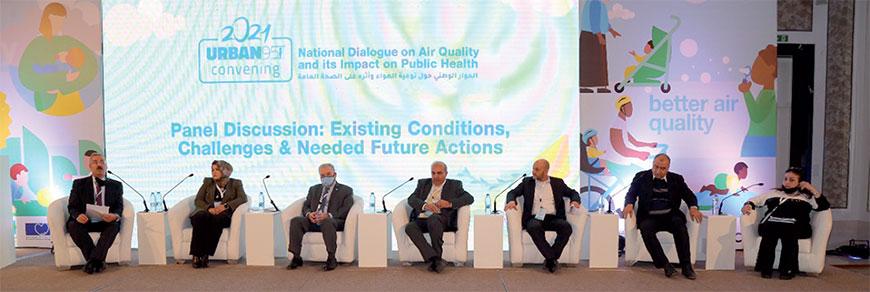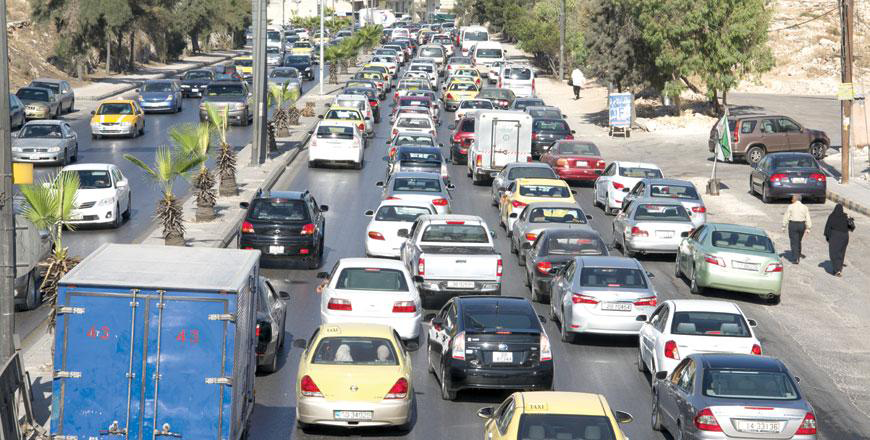You are here
Air pollution is one of major causes of death in world — Princess Sumaya
By JT - Nov 24,2021 - Last updated at Nov 24,2021

Speakers during a panel discussion on the sidelines of a workshop on the quality of ambient and indoor air and its health effects on Tuesday (Petra photo)
AMMAN — HRH Princess Sumaya, president of the Royal Scientific Society (RSS), said that air pollution is one of the major causes of death in the world, as statistics indicate an annual death toll of seven million people as a result of causes related to the quality of ambient and indoor air.
In a speech delivered on her behalf by the Vice President of the RSS/Executive Director of Sustainable Solutions, Rafat Assi, the princess pointed out the need to focus on suspended particles with a diameter of less than 2.5 microns (PM2.5), which pose a great danger to human health, especially children, stressing that these particles settle in the lungs, causing serious respiratory diseases, according to an RSS statement.
During a national workshop on the quality of ambient and indoor air and its health effects, held under her patronage on Tuesday, the princess stressed the need to exert effort and cooperate with all the concerned parties to enact legislation and laws related to indoor air quality.
She also noted the need to continue monitoring the surrounding air and ensuring its quality.
The princess praised the close cooperation between the RSS and the Ministry of Environment in the field of ambient air monitoring since the 1990s through the operation and management of 12 ambient air monitoring stations in various regions in the Kingdom that may be exposed to air pollutants, within the National Ambient Air Quality Network of the Ministry of Environment.
Her Royal Highness indicated that the results of monitoring within the national network showed an improvement in the levels of some pollutants as a result of implementing a package of strategic environmental projects.
The workshop, organised by the RSS and in cooperation with the Bernard van Leer Foundation, the Royal Society for Health Awareness and Our Council for Community Development, aims to shed light on the dangers of exposure to air pollution and its impact on adults and children, especially those in the early stages of development.
The workshop was attended by Secretary General of the Ministry of Environment Mohammed Al Khashashneh, Secretary General of the Ministry of Local Administration Hussain Mhaidat, Director of the WHO Regional Centre for Environmental Health Action Ahmed Basel Al Yousfi, and representatives from the Ministry of Public Works and the Ministry of Health and the Greater Amman Municipality.
Among the aims of the workshop were the exchange of expertise in the field of air pollution and the promotion of national dialogue on ambient and indoor air quality in buildings and its impact on public health.
The workshop, which was held in Amman and attended by a wide range of stakeholders in the field of air quality, public health, and urban planning in Jordan, discussed the role of urban design and planning and its impact on improving the quality of ambient and indoor air.
In her opening remarks, Andrea Torres, the programme director of Bernard Van Leer Foundation, stressed on the linkages between indoor air quality and the health of babies, toddlers and caregivers.
Najat Aoun Saliba from the American University of Beirut presented some of the results of the research she had prepared on indoor and ambient air quality, calling for collective action to prevent smoking in all its forms and improve ventilation inside buildings.
Najat also called for raising awareness of the issue of ambient air quality in roads and neighbourhoods, providing information related to air quality more broadly, and strengthening local and global cooperation in this regard.
The participants, who were organised into working groups, exchanged expertise and ideas and worked together to analyse the roles and responsibilities on the quality and control of ambient and indoor air and its impact on public health and the role of urban planning in improving air quality in cities.
At the conclusion of the workshop, the participants recommended the necessity of adopting policies and legislation related to indoor air quality.
They stressed the need for cooperation between all stakeholders in air quality. It was suggested that the Ministry of Environment should enact relevant legislation, and the Ministry of Health should limit the negative impact of air quality on public health, while the Ministry of Public Works could amend building codes to include appropriate natural ventilation that prevents the concentration of household pollutants, read the statement.
In addition, the Greater Amman Municipality could help by introducing transport policies and procedures to reduce carbon emissions from vehicles, and by monitoring air quality in cities and public parks, concluded the statement.
Related Articles
The Ministry of Public Works signed two cooperation agreements on Sunday with the Royal Scientific Society (RSS) in the fields of quality control related to outputs of quarries and sites producing concrete mixtures.
AMMAN — Emissions resulting from human activities, especially in transport, manufacturing and energy sectors, which burn fossil fuels, as we
AMMAN — The Royal Scientific Society (RSS) and the Environment Ministry on Monday signed the 2015 agreement of the national project to monit












